Mary Anne Yarde's Blog: The Coffee Pot Book Club , page 82
July 20, 2020
Check out Grace Augustine's fabulous book — Treasures of Love #Anthology #Romance @mallidalli
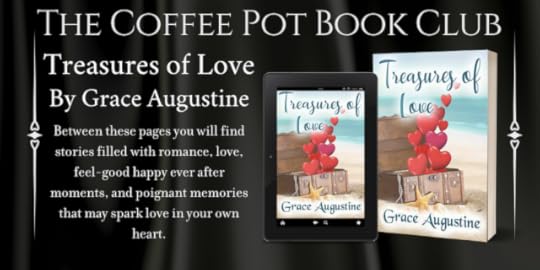
Treasures of Love
By Grace Augustine
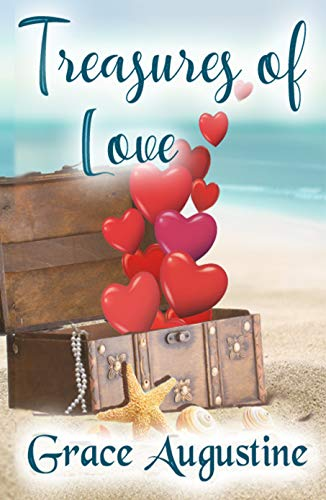
It's been said countless times that Love is the Universal Language. There may be truth to that. We all crave love...from the time we are born to our last breath.
TREASURES OF LOVE is a collection of love stories that showcases the many forms of love: love between friends, the love for a talent or gift, the love of a favorite food, the love for your significant other, your children, your parents...even love of yourself.
Between these pages you will find stories filled with romance, love, feel-good happy ever after moments, and poignant memories that may spark love in your own heart.
Pick up your copy of
Treasures of Love
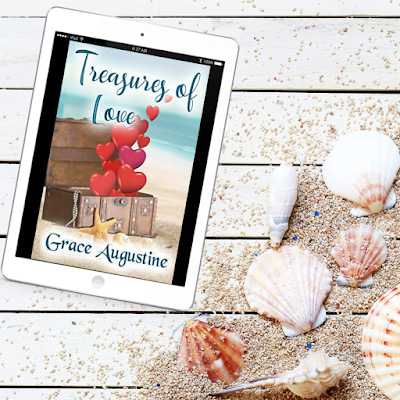

Author and Editor, Grace Augustine, resides in Iowa with her older son and teenage cat, Bou. She enjoys acrylic painting on canvas, old movies and 70's music. Grace has written 21 books, to date, in multiple genres, including a self-help book about her journey with multiple sclerosis.
Connect with Grace: Website • Facebook • Twitter.
Check out Charlie Tyler's fabulous #NewRelease — The Cry of the Lake #Gothic #mustread @CharlieTyler17 @darkstrokedark

The Cry of the Lake
By Charlie Tyler

A gruesome discovery unravels a dark trail of murder and madness.
A six-year-old girl sneaks out of bed to capture a mermaid but instead discovers a dead body. Terrified and unable to make sense of what she sees, she locks the vision deep inside her mind.
Ten years later, Lily is introduced to the charismatic Flo and they become best friends. But Lily is guilt-ridden – she is hiding a terrible secret which has the power to destroy both their lives.
When Flo’s father is accused of killing a schoolgirl, the horrors of Lily’s past come bubbling to the surface. Lily knows that, whatever the consequences, she has to make things right. She must go back to the events of her childhood and face what happened at the boat house all those years ago.
Can Lily and Flo discover what is hiding in the murky waters of the lake before the killer strikes again?
Excerpt
I thought The Tree of Promises was a dangerous choice for hiding Amelie’s belongings. On a late summer’s evening the tree would be swarming with young lovers/potential witnesses. But Grace explained she needed to put the bag somewhere it would be found and somewhere that would suggest love had played a cruel part in Amelie’s death. The tree was the perfect choice.
We arrived at the empty clearing when the fat wood pigeons were flapping and chuntering into their roosting positions; sending dozens of white, fluffy feathers tumbling down to the woodland floor. Barney and I stood on sentry-duty, blocking the path which led from the main bridleway to the tree. I could hear Grace scuffling around the base, overturning moss and clumps of dark leaves, rearranging the woodland debris around the bag.
She was taking too long.
I hooked Barney’s lead around the peeling trunk of a silver birch and crept back to the clearing. I could smell damp earth and bruised nettles. Patches of white light shivered on the ground, lighting up a ring of sickly-yellow toadstools and within the pockets of sunshine buzzed clusters of tiny, winged insects.
Grace was standing, gazing up at the underside of the branches, clutching a garland of tiny sapphire flowers. She appeared to be lost in thought. I was about to step forward, to discover more about this extra detail she was leaving, but something stopped me. Her manner was strange; her ribcage heaved in and out and her lips moved but she made no sound. She bent her head, her auburn hair falling like a curtain over her face and kissed the garland before she looped it on one of the branches. Then she took a step back, her eyes downcast, while a solitary tear ran down her cheek. This was not part of leaving a clue for the police. This was personal and yet, in my entire life, I had never known my sister to have been in love with another person; she simply wasn’t capable of such an emotion. I retreated then crunched around in the undergrowth so that, when I re-emerged, she had turned back into a creature hewn from granite.
Pick up your copy of
The Cry of the Lake
Charlie Tyler
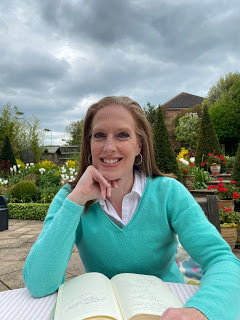
Charlie signed with Darkstroke in May 2020 and The Cry of the Lake is her debut novel.
Charlie is very much a morning person and likes nothing more than committing a fictional murder before her first coffee of the day. She studied Theology at Worcester College, Oxford and now lives in a Leicestershire village with her husband, three (almost grown-up) teenagers, golden retriever and tortoise.
Connect with Charlies: Website • Facebook • Twitter • Instagram.
July 19, 2020
#HistoricalFiction author, Michael Jecks, is talking about what inspired him to write his fabulous — The Vintener Trilogy #Medieval #GreatReads @MichaelJecks

An Author Inspirations
By Michael Jecks
 When I was at school, my absolute conviction was, that I wanted nothing to do with the arts as a career. The income would be irregular, probably low, and I was determined to be sensible. I studied hard and went to university to study Actuarial Science.
When I was at school, my absolute conviction was, that I wanted nothing to do with the arts as a career. The income would be irregular, probably low, and I was determined to be sensible. I studied hard and went to university to study Actuarial Science.
It was very interesting, to discover that exams could be failed. Also, I knew actuarial work was very well paid, but I hadn’t heard the definition of an Actuary: “someone who finds accountancy too exciting”. This soon became clear to me as I stared at LIFE AND OTHER CONTINGENCIES and ADVANCED CALCULUS with not even a faint flicker of comprehension.
I left university without a degree and joined the ranks of the employed, taking a position with a small company selling office equipment. Soon I was selling office automation computers for companies like Wordplex, Xerox and Wang laboratories. But in the eighties a recession hit. Every company I worked for went bust - invariably owing me considerable sums. My incentive to start a new career came when I had totted up thirteen jobs in thirteen years. It seemed to me that someone was giving me an almighty hint.
So, in 1994, I started to write.
I had tried to write books before. At one low point in my life, while parked in a jam on the M25, I had heard an author on the TODAY programme talking about her life. She mentioned that she earned ten percent of the price of a hardback, and sold fifty thousand copies a year. Books then cost about sixteen pounds each. So she earned eighty thousand in hardback sales alone - and then she had paperbacks too. Those numbers stuck in my head as I stared at the row of stationary cars in front of me.
From that day, when ever I had spare time, I would sit and bash at a typewriter - but I never could break through the two or three chapters barrier. If I had been able to find more time perhaps I could have continued one of those stories, but the life of a computer salesman was hectic, and time was at a premium.
However, my thirteenth employer (now, happily, sunk to Dante’s fourth circle of hell) had the temerity to dispense with my services without actually folding. Floating on the stock market, they fired everyone who didn’t have employment protection, to make their figures look better. I was out of work, and never received my final pay cheque - which I balanced by retaining their IBM PS2 computer.
I started to write.
But what should an unemployed (and unemployable) computer salesman write about? All I knew was, I loved reading. I loved thrillers, especially fast-paced action stories, so I started the idea for a book rather like a Frederick Forsythe (at least, it was in my mind). I began on the first of January, and by the end of the month had my first draft.
That book, THE SNIPER, was accepted in a matter of weeks by a publisher over the phone. A few weeks later, we received a letter - it was a formal rejection. Why? Because the book was thrilling, fast, full of bombs, bullets, fast ladies and fast cars, and in particular the IRA. And they agreed their first cease-fire just after the telephone acceptance, so my book was dead in the water.
However, fortunately, in the meantime I had written the draft of another book. This was a medieval story, set in the early 1300s, and became the first of my Last Templar Mystery series starring Sir Baldwin de Furnshill and Bailiff Simon Puttock, set mostly on Dartmoor in Devon.
I have always been fascinated by history, and especially the history of warfare - not only the strategies and tactics of the battlefield, but also the politics and social issues that led to war in the first place. In late 1993, I read a book by the American historian John J. Robinson called DUNGEON, FIRE AND SWORD, a history of the Knights Templar. It was, for me, quite revelatory, and gave me several strands of ideas that I would employ for over thirty two titles in my Last Templar Mystery series.
But the inspiration did not stop there. I began studying that century in depth; initially the very beginning of the period, during the reign of the unhappy King Edward II, but that forced me to read on into the period of Edward III, his son, and naturally I began to study the Hundred Years War, the seeds of which were sown in Edward II’s reign, but which flourished in the 1340s.
I was enthralled by this period: this was the time of Crécy, of Calais, of Poitiers - but it was also that of the great European famine and the plague.
It was fascinating, and because it led on from my original series, it was very attractive. I began to study it carefully, going to visit the tombs of soldiers of that period, such as Sir John de Sully, one of the early Knights of the Garter, a man who lived to a hundred and six years, who fought in the battle of Najera when he was over seventy years old, serving under the Black Prince. He was a truly inspirational man for a writer, and I started to sketch out ideas for him as I learned more about him.
 Sir John de Sully after his death in 1386. He was born in 1281. His tomb is in Crediton church.
Sir John de Sully after his death in 1386. He was born in 1281. His tomb is in Crediton church.
Before long I had the idea of a BAND OF BROTHERS theme: a group of men taken to war. What would motivate them, why would they have sought to cross the sea to attack a country vastly larger than their own, with an army thought to be the most advanced and powerful in all Christendom? What would the men have felt when they made that great march from the coast all the way to Paris, before fleeing before the French King’s forces, to finally turn at bay at the fateful battlefield of Crécy?

I had the idea of using Sir John de Sully as a commander, and then set to invent a group of archers under him. In a tribute to George MacDonald Fraser’s wonderful book QUARTERED SAFE OUT HERE, I called the Falstaffian commander “Grandarse”, and the more solid leader of twenty bowmen, the Vintener, Berenger Fripper. Under him were the whiners, the jokers, the stern, the anxious, and the frankly psychopathic.
The first book using these was set on the march to Crécy, and this, the second, BLOOD ON THE SAND, is the tale of the year following, when much of Edward’s army was camped outside Calais, hoping to bring the French to battle again, hoping to capture the city as a foothold on French soil ready to be exploited. It was the year of French invasion forces landing in Scotland to attack the English at their weakest, a year of swift riding for my archers, a year when they lost comrades, and gained more. And it was a year when Berenger Fripper and others began to wonder why they were fighting.

The Vintener Trilogy has been very well received, and I hope you will enjoy it too!
Blood on the Sand
(The Vintener Trilogy Book 2)
By Michael Jecks
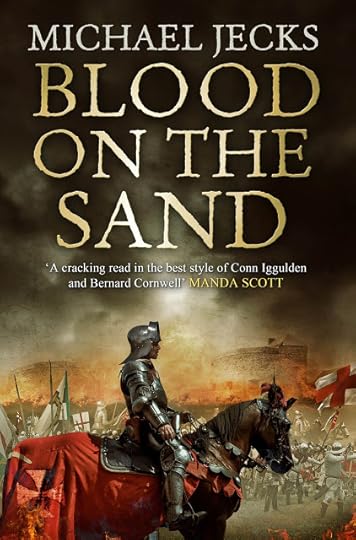
The Siege of Calais, during the Hundred Years' Wars. The thrilling second novel in a new series for master of the historical adventure, Michael Jecks, perfect for fans of Bernard Cornwell and Conn Iggulden.
Calais, 1346. Berenger Fripper and his men are stationed in the ancient port city, a city under English control and surrounded by enemies. They are here to defend their newly won territory from the French and their allies the Genoese.
Enemies are all about them, but there is also trouble within. Someone in the vintaine is leaking vital information to the French, jeopardizing not only the safety of the men but also the future of the war, and Berenger must find out who before it's too late.
And when the vintaine is attacked at sea and captured by the Genoese it looks as though their luck has run out. Can Berenger defeat the enemies that surround him and keep the English victorious?
Praise for Michael Jecks
"More magic by the master of the medieval”
Quintin Jardine
"Michael Jecks is a national treasure"
Scotland on Sunday
“A textbook example of how to blend action and detection in a historical”
Publishers Weekly
Pick up your copy of
Blood on the Sand
Add The Vintener Trilogy to your 'to-read' list on


Michael Jecks

Michael Jecks is the author of the bestselling Knights Templar series. A regular speaker at library and literary events, he is a past Chairman of the Crime Writers' Association and a Fellow of the Royal Literary Fund at Exeter University. He was shortlisted for the Harrogate/Theakston’s Old Peculier prize for the best crime novel of the year 2007, the year Allan Guthrie won. He lives with his wife, children and dogs in northern Dartmoor.
Connect with Michael:
Website • Twitter • Facebook • YouTube • Instagram
#BookReview — Bonfire of the Perfect by Susan Appleyard #Medieval #Crusades
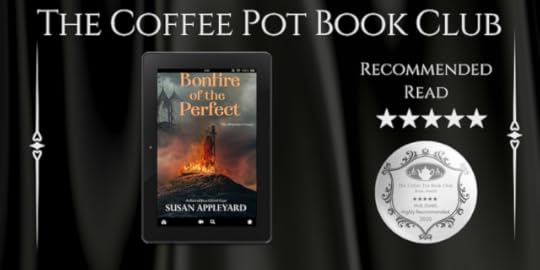
Bonfire of the Perfect
By Susan Appleyard
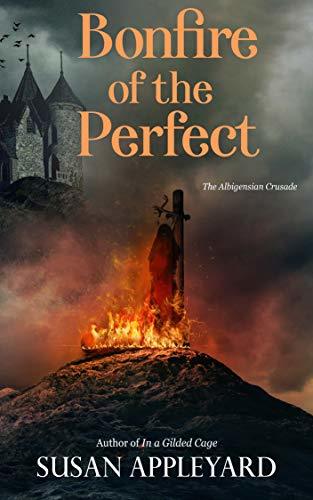
Prompted by the murder of his legate, in 1209 Pope Innocent III launches a crusade – not against the infidels of the East, but against fellow Christians living peaceably in the south of France. They are the Cathars, regarded as heretics by the Roman Church, and the sect is flourishing. Thousands of knights, landless younger sons, mercenaries and assorted riff-raff pour south with Christian zeal to exterminate men, women and children of the same country. A dilemma soon arises: How to tell a Cathar from an orthodox Catholic?
Lovers Bräida and Jourdan are torn apart when Carcassonne falls to the crusaders. Jourdan joins the resistance while Bräida flees with her family to the relative safety of the Pyrenees, neither knowing if they will see one another again. But Bräida is not safe in her mountain retreat, because the Church has found an answer to its dilemma – the creation of the Inquisition. No one can escape its diabolical clutches.
This is a story of faith, endurance and the love of liberty in a time of unimaginable cruelty.

"Much will be written by the other side, I'm sure. The winners have a claim on history while the losers are shovelled into the ground and their stories expunged. Mine will be a story of love and war, a war that ended as the conquest of an entire province. It was an episode of manifest injustice and unparalleled cruelty that we must never forget…"
When God turns his back on his children, then the blood of the innocent would be spilt upon the street. A Holy War, that is what they were calling it. But this time it was not the infidel that would suffer, it would be the heretic.
For years they had lived alongside the Cathars, they were neighbours, friends. Yet, now the Pope was asking the congregation to forsake them, to give them up to the fire.
However, in the heat of battle how can one tell the difference between a Cathar and a Catholic?
From a young girl's dream of the future to the devastating consequences of choosing to stand with the oppressed, Bonfire of the Perfect by Susan Appleyard is a beautiful, yet powerfully emotional story of one woman's experience during the Albigensian Crusade (1209–29).
I thought this book was going to be an emotional read, and I was right! I was so glad that I had some tissues close at hand because I certainly needed them. However, this is a novel that once started was impossible to turn away from. This story, these characters, utterly mesmerised me. Bonfire of the Perfect is what Historical Fiction is all about.
Although the main protagonist is not a Cathar, this book is very much about their terrible persecution. The plight of the Cathars is not something one often finds depicted in Historical Fiction, so I was really looking forward to seeing how Appleyard would approach their beliefs and their practices. History tells us that the Cathars rejected the authority of the Catholic Church, they instead based their faith from the teachings in the Gospels. The violence in which the Catholic Church responded to the pacifist Cathars was almost without precedence — it was, to put it simply, an act of genocide. Appleyard has taken that history and shed new light on the absolute horror that the Cathars suffered at the hands of fellow Christians. The corruption of the Catholic Church and the greed of the monarchy and the aristocracy during this era is only eclipsed by their collective determination to stamp out anyone who had dared to contradict their teachings or question their authority. Their reaction by the Catholic Church must have confirmed the Cathars' belief that the evil God of the Old Testament “Satan” did indeed rule the world, for the good God of The New Testament would never have called men to their cause with the promise of wealth and land. Nor would He have sanctioned the murder of the innocent. This is the kind of novel that makes a reader stop and think, and it clearly demonstrates how power corrupts absolutely. Appleyard approaches her story with a deep understanding of the history of this period. She has depicted this terrifying world where both Cathars and, in many cases, Catholics were brutally murdered for either opposing a corrupted organisation or for being at the wrong place at the wrong time. Appleyard confirms very elegantly that there was nothing Holy about any of the Crusades.
Bräida was a protagonist that I really came to care about. Bräida experiences injustice — she had witnessed the cruel whispers of the Inquisition, and she has seen her fellow countrymen murdered on the orders of a Pope who knew nothing of compassion. Yet, still, she retains an inherent goodness that would not be tarnished by the war that had dominated her life. Bräida suffers so much in this book, and yet she does not let the situation break her. Bräida is a heroine because she bears the unbearable, and she never gives up but approaches life with a determination to make the very best of it. Her relationship with Jourdan and Dulcia was particularly heartrending. I thought Appleyard's depiction of Bräida was utterly sublime.
Likewise, Jourdan is a protagonist that really tugged at my heartstrings. He comes from nothing and yet he has more honour than those with title and wealth. His story is tragic. However, it is incredibly compelling. I thought Jourdan's portrayal was wonderful.
The antagonists in this story are found in the hierarchy of the Catholic Church, the French monarchy and the aristocracy. Their dogged determination to hold onto their power and wealth is evident throughout this novel. They did not care who they hurt and who they had to kill to acquire more wealth and more land. It was also an opportunity for pious knights to win a Crusade Indulgence without having to travel to The Holy Lands. The fact that a papal legate allegedly stated "Kill them all. God will know his own," demonstrates the ruthlessness of the Church during this era. Against such an enemy, the best that our brave protagonists can do is survive. I thought the depiction of the Catholic Church and the determination of the French king to establish authority over the south during this era was very authentic in the telling.
The hours that Appleyard has dedicated to researching this period of history shines through in the enthralling narrative. Appleyard has an almost visceral understanding of what makes history worth reading, and she is also the perfect tour-guide to take her readers on a trip back in time to a dangerous past.
This is a story that is rife with historical controversy, and yet I felt it was also a very honest interpretation of the Albigensian Crusade. But what makes this book stand out from a crowded bookcase is Appleyard's novelist eye for the human detail. Within the pages of this remarkable book, we witness the very best and the very worst of humanity. Bonfire of the Perfect by Susan Appleyard is a poignant story and one that will stay with a reader long after they have turned that final page.
I Highly Recommend.
Review by Mary Anne Yarde.
The Coffee Pot Book Club.
Pick up your copy of
Bonfire of the Perfect
Susan Appleyard

Susan was born in England, which is where she learned to love English history, and now lives in Canada in the summer. In winter she and her husband flee the cold for their second home in Mexico. Susan divides her time between writing and her hobby, oil painting. Writing will always be her first love
Connect with Susan: Blog • Goodreads • Amazon Author Page.
July 15, 2020
Check out Sheri Peppers' fabulous book — Beloved Woman #HistoricalFiction #HistoricalRomance @sheripeppers1

Beloved Woman
By Sheri Peppers
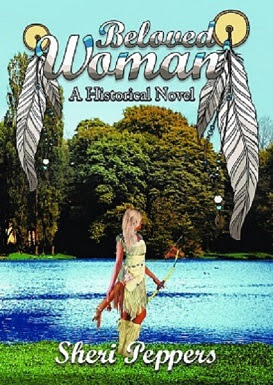
He was her rock. But when Bryanna’s aristocratic father is brutally attacked by the Iroquois, dying in her arms, she vows to him he will be avenged. Beloved Woman is the epic journey of a privileged young Englishwoman who accompanies her merchant father to the new world.
Thrust into the primal brutal world of the American Indian, Bryanna is transformed into a warrior amid the clashing cultures of the Cherokee, Creek, and Iroquois in the year 1705.
Bryanna and her father arrived in North Carolina from London to trade for furs with the Cherokee Indians in the Allegheny Mountains. A campsite attack changes her world. Her only reason for living is to deliver her father’s murderer to justice. Nothing will stop her, especially the Cherokee Chief named Black Bear and his warriors who brings her wounded unconscious body to their town.
During dark sleepless nights and empty days, desperate thoughts of finding a way to capture her father’s killer consume her. She learns of the war women, called Beloved Woman, in the town of Toxaway. If she became Beloved Woman, her chances of finding her father’s killer would be much greater. This couldn’t be more perfect for her. She will learn the ways of the Cherokee in the great Allegheny Mountains even if it kills her.
Beloved Woman captures the heart, bringing to light bravery, love, and passion.
Excerpt
She lifted the towel and cleansing bar from the bedroll; and climbed onto the wagon that held her clothing in a large velvet valise. She pulled a fresh riding habit, change of clean undergarments and a small pouch concealing a loaded pistol. Jeremiah made her slightly uneasy about the creek. Although she would never reveal the discomfort to him, she didn’t want to be caught half-naked by some smelly stranger. In haste she slipped the pistol between the folds of the towel and stepped down off the wagon. No one paid any attention to her as she turned and headed in the direction of Blossom Creek.
Mountainous pines surrounded the dark body of water, unveiling an air of blissful seclusion. The sun, still in the midst of setting, radiated enough light through the trees, and a smattering of warmth to make somewhat tepid water.
She must work swiftly, for when the sun went, so would the tiny warmth. Copper eyes filled her mind, as she unfastened her riding habit, allowing it to fall to the ground. A chill from the approaching night stroked her bare arms as she clamped her teeth at the cold’s sharp bite. Her bones quaked at the iciness seeping its way through her scant undergarments. Large muscular arms enveloping her surely would have kept her warm.
Bryanna shook her head to release the memory of that near-naked Chief in the loincloth. If only she hadn’t seen him. Her father would disown her for such impure thoughts.
She stepped out of her riding habit and tossed it onto the water's edge. Working quickly, she rinsed the garment and squeezed out the excess water. She laid it flat on a nearby gathering of large boulders, not touching the blanket of moss that covered halfway over the surface.
As she stepped into the creek’s water, the chill of it jolted her to the reality that this bath would rise to be the most torturous of her life. She lathered the length of her slim legs and rinsed them. Still wearing her undergarments, she dipped her body and hair into the water. Her knees rattled wildly as she stood with the water coming just below them. Her arms felt stiff from the cold seeping into her skin. Her hands moved like a galloping horse, but she couldn’t lather fast enough over her undergarments and throughout her thick tresses. Once again, she dipped into the water's iciness as it bit her flesh with a vengeance. Her jaw clenched nearly to the point of breaking her teeth.
With the sun now almost gone, the night slowly crept through. A crisp new breeze flowed in cold streams, whipping its way through her dripping hair. Her teeth chattered, as she pulled her wet undergarments from her body and donned the dry ones. She sighed in relief at its dryness pressed against her skin. Black Bear’s high cheekbones and chiseled jaw suddenly danced in her memory.
“Oh, this must stop,” she demanded of herself, squeezing her eyes tight pushing his handsome face out of her mind.
As she placed the towel around her head, a strange snap came from behind one of the large pines. She froze.
Her eyes grew wide as Jeremiah's warnings pierced her memory. Looking down the length of her body, she realized she was still unclothed. She pulled on her riding habit over her head letting the towel drop from her hair.
Another sound cracked into the night. Her thoughts raced. The terrifying vision of ambush rushed into her heart like a fine blade.
Bryanna knelt next to her pouch, untied it, and removed the pistol. Placing one cautious step in front of the other, she followed the direction of the sound. Pulling back the hammer of the pistol, she locked it into place.
Behind a tall pine, rested a group of large boulders piled high on one another. She peered up, and against the blackness of the night sky, the outline of a dark figure sat on top. Slowly, she raised the pistol toward the form. She instantly faltered, realizing the difficulty of this for someone who had never killed before. Squirming at the thought of taking one’s life, she swore something had crawled up her back and bit at her flesh.
She swallowed hard, realizing she must take her mind away from the wrenching fear. Her index finger rested on the pistol’s trigger. Taking in a breath, she slowly applied pressure.
Pick up your copy of
Beloved Woman
Amazon UK • Amazon US • Barnes and Noble
Add to your ‘to-read’ list on

Sheri Peppers

Sheri studied writing and screenwriting at University of California Los Angeles, and Moorpark College in California. She is an avid history buff with an emphasis on the American Indian, and a former member of the Romance Writer’s of America. Retired with an 18-year background in aerospace, she now lives in Thousand Oaks, California, where she is working on a sequel to Beloved Woman and plans for several projects.
Connect with Sheri:
Jonathan Posner is sharing an excerpt from his fabulous book — The Witchfinder’s Well #timetravel #HistoricalFiction #Tudors

The Witchfinder’s Well
By Jonathan Posner
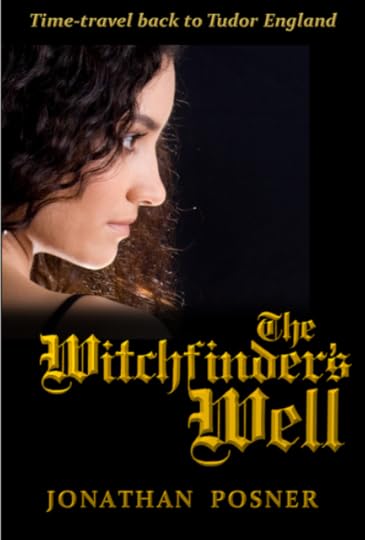
Tudor England – a dangerous world where a few wrong words can get you accused of witchcraft and burned at the stake.
So when a freak electrical storm sends modern-day girl Justine Parker time-travelling back to 1565, she quickly becomes the target of sinister witchfinder Matthew Hopkirk.
Justine must use all her cunning and ingenuity to keep one step ahead of Hopkirk. But not only must she save herself, she also has to save her new love, Sir William de Beauvais, from the early death she knows history has decreed for him.
Can Justine save herself from Hopkirk? And what if she saves Sir William from one fate, only to pitch him into another, even more terrifying?
Praise for The Witchfinder’s Well
“Bringing the Tudors to life! … an engrossing thriller with plenty of twists and turns.”
“So much has been written about the Tudors, but It's refreshing to read a different take on them. A cracking good read and well written!”
“A excellent read.. love history.. loved the book”
“I couldn't recommend this book more highly.”
As she surveyed the royal banquet from her high vantage point in the Minstrel’s Gallery, Justine Parker twisted slightly to get more comfortable in the tight bodice of her gown.
All things considered, it was going pretty well.
An army of servants had brought exotic dishes up from the kitchens into the Great Hall and presented them to the assembled ladies, gentlemen, knights and courtiers for their appreciation and amazement.
There were dishes such as the noble roast peacock with its plumage dancing in the light, guinea fowl in a deep crusty pie and legs of mutton surrounded by mountains of peas and carrots. Fine red claret was drunk copiously from silver goblets, with the servants replenishing them from silver pitchers as they weaved around the tables.
Justine leaned on the railing of the gallery and let the warm sound of conversation and laughter wash over her; the rich hubbub of noise that rose up to the furthest corners of the magnificent ornate plaster roof. Down below her, the face of every guest was bright with enjoyment, bathed in the golden glow of a thousand flickering candles.
In the middle of the high table, Her Majesty Queen Elizabeth sat bolt upright, her bright eyes dancing round the room as the courtier to her right engaged her in conversation.
Justine admired her pale beauty, set off by her striking bodice of red velvet edged with gold lace and sparkling with a thousand shimmering pearls, together with the single flashing emerald at her neck that brought out the green fire in her eyes. Then there was her red-bronze hair adorned with its simple, elegant gold crown, framed by the high pearl-edged lace ruff that flared up from her shoulders.
With a small raise of her hand, the Queen paused the conversation with the courtier beside her and looked up at the gallery. Maybe Justine’s small twisting movement had caught her eye. She held Justine’s gaze a moment, then gave the smallest nod of her head – so small that it could easily have been missed – as if to congratulate Justine on the success of the banquet she had organised.
With a smile Justine bowed her own head and gave a gentle curtsey. The Queen nodded again, then turned back to the courtier and resumed their conversation.
In the gallery Justine smiled again, this time to herself.
Yes, all things considered, the banquet was going pretty well.
She looked down across the room, taking in the full scene. The long high table ran along the back wall under the big windows with the Queen in the centre. On either side Justine had seated her most important courtiers, looking resplendent in their richly-coloured silk doublets with slashed sleeves and fine white ruffs. Beyond the courtiers she had seated the women, elegant in their low-cut gowns, their hair carefully parted in the centre and tucked under their French hoods – a style introduced originally by Elizabeth’s mother, Anne Boleyn.
Justine’s gaze moved to the table down the left side of the room. The people here were less important and their clothes reflected this – the men wore plain doublets and the women wore their hair in simple cotton coifs rather than the more elaborate French hoods of the high table. Their behaviour was no less exuberant, if anything slightly more so, and Justine smiled as they all laughed at a joke from the jester who had been moving round the tables. His brightly-coloured motley costume consisted of a tunic split into a red half and a yellow half, while his hose had one red leg and one yellow leg on the opposite sides. In his hand was a small jester head on a stick, which he was using to entertain the guests.
From behind her came the sound of the minstrels; four elderly men with lutes playing light-hearted music that was all but lost against the loud noise of the room. Their piece came to an end, and she turned to them.
“You play well, good sirs,” she said with a twinkling smile. “What is next?”
“We have not yet played Greensleeves,” said the eldest minstrel. “But first we need a drink.” All four reached down for the tankards by their stools and drained them with great satisfaction. The oldest man then examined the bottom of his empty tankard and looked up at Justine expectantly. She laughed and reached for the large pewter jug ready by her feet, then went to each in turn, pouring more beer into their proffered tankards.
“Ahh, thank you my girl,” said the oldest man, “it is always a pleasure to play at one of your banquets.”
Justine curtseyed in reply. The men drank some more, then put down their tankards and launched into Greensleeves.
She turned and resumed her gaze across the Great Hall.
To her right was a smaller table seating more people, with a carving table beside it. On the wall above was a large portrait of a handsome knight in a shining breastplate standing with a white stag in the background. Her gaze stopped on this portrait, as it so often did, and she gave a small sigh as she studied the man’s long blond hair and trim beard.
The jester turned from the table he’d been entertaining and looked up, catching sight of Justine as she stared across at the portrait.
His gaze took in her shoulder-length cascade of russet-coloured ringlets trying to escape from under her French hood; her small, slightly snub nose, her pale blue eyes under thick, dark eyebrows staring with a faraway look at the portrait…
He gave a little dance and waved his stick to catch her eye.
She spotted him and gave a small wave back. He raised an enquiring eyebrow, then flicked the stick up behind his back so the little jester head on the end popped up on his shoulder.
He turned to it and appeared to have a brief conversation, then pointed up at her. The little head on his shoulder nodded. He made a ‘doe-eyed’ face – a gross over-exaggeration of hers, with a sickly grin and fluttering eyelashes – then pointed back at her. The head nodded again, then both the jester and the head turned to look up at her, with the jester smiling broadly.
She couldn’t help but laugh and he laughed back. Then he gave a low courtly bow, while she applauded.
The jester turned back to the room and started dancing sideways up towards the high table.
Still chuckling, Justine’s gaze moved upwards to the large tapestries depicting heroic scenes of hunts that were hanging round the hall between the sconces. In one scene knights attacked a stag with spears and arrows in a green forest; in another a different stag was running from a pack of baying hounds, followed by nobles on horses.
Justine looked back down at the hall. The servants had cleared the main courses away and were now circulating with bowls of fruit and more wine.
‘Only an hour more and we’ll be cleared and finished,’ she thought, as she twisted once more in the tight bodice of her gown.
Just then she became aware of an insistent beeping sound over the noise of the room. Fishing her mobile from the pocket of her gown, she swiped the screen.
“Hello, Justine Parker here.”
“The taxis have started arriving,” said a voice. “They’re early.”
Pick up your copy of
The Witchfinder’s Well
Amazon UK • Amazon US • Amazon AU
Jonathan Posner
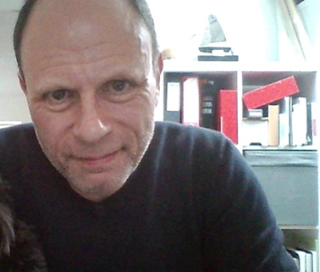
Jonathan started writing at university with a one-act comedy play called 'Private Eyes', directing and acting in the premiere production. After University, Jonathan wrote book and lyrics for a full-scale musical called 'Spirit of History', which was premiered in Windsor. The plot idea and main characters from this show have since been turned into his first novel 'The Witchfinder's Well', a time-travel / Tudor-period fantasy romance, which he published in 2015.
Jonathan has also written two other Musical libretti - 'Hot, Mean & Green', which premiered at the Rhoda McGaw Theatre in Woking, and 'A Fine Time for Wine', which also premiered in Windsor.
In 2017 he published an anthology of short stories called ‘Once Upon an Ending’ (available on Amazon).
‘The Alchemist's Arms' - the sequel to ‘The Witchfinder's Well', was published in 2019 on Amazon, and a third book in the series is planned.
Jonathan is currently working on a series of action adventure novels for young adults set in Tudor England. The first of these is 'Mary Fox and the Broken Sword', which is planned for publication in 2021.
Jonathan is married with two adult sons and lives in Windsor. When not writing he works in advertising, and is a regular presenter on Marlow FM radio.
Connect with Jonathan:
Website • Twitter • Facebook • Instagram.
#BookReview — Echoes of the Storm by Charlene Newcomb #scifi #spaceopera @charnewcomb
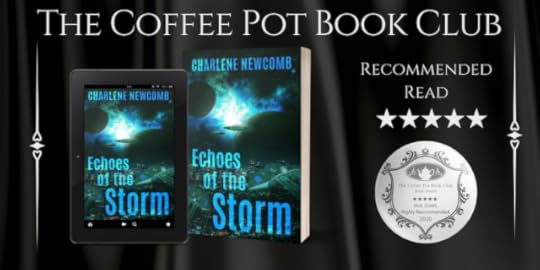
Echoes of the Storm
By Charlene Newcomb
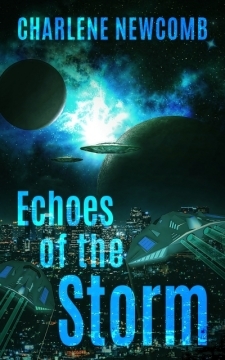
The battle for Torredo is over, but the war has just begun…
Jack Gamble’s lover is a double agent. Norse betrayed the resistance and now commands Galilei’s military operations.
Rallying what remains of the resistance and their galactic allies wasn’t part of Jack’s plans. His contacts are scattered, maybe dead. Streams are broadcasting his face from one end of the galaxy to the other, and mercenaries under the command of Captain Ben Stone intercept his ship.
Space pirates, friendly interrogators, security grunts, and Norse stand in Jack’s way. Can he trust Stone? The intriguing captain has his own problems with the empire – and an interest in Jack.
Jack isn’t looking for a one-night stand, and any emotional entanglements need to be off the radar. He has a rebellion to win and a world to take back. Failure means his people will never break the empire’s chains, and his homeworld is screwed.
Norse already did that to him.
He won’t let it happen again.

“We could spend hours reciting the names of friends we’ve lost. It won’t bring them back. We’ll honour them by ending Galilei’s rule…”
But that was easier said than done.
Jack Gamble had been every kind of fool. He had thought that what they had was love, but it wasn’t love, he knew that now. Ari Norse had used him to get what he wanted. He had used them all. With the resistance scattered and his heart broken, Jack flees his homeland.
However, Norse is not a man who gives up easily, and he certainly isn’t going to give up on one of the resistances greatest fighters. He knows Jack. He knows how he thinks. And he has the perfect weapon in which to manipulate his former lover and bring him back home. Jack will meet his fate. He has to. For it is the only way Norse can get what he truly wants.
From a desperate flight to a battle that will decide who is the better man, Echoes of the Storm by Charlene Newcomb is the unforgettable story of Jack Gamble and his resistance friends.
With a realistic science fiction backdrop and a narrative that entices, enchants and enthrals, Echoes of the Storm has an awful lot to recommend it. There is an authenticity to the atmospheric backdrop, and a realism in the characters that one meets on this journey that Jack Gamble finds himself on. But this is not the story of just one man, but a group of resistant fighters, who fight for their planet, the galaxy, but more importantly each other. This book has it all. There are desperate betrayals, extraordinary acts of heroism and a beautifully tender love story as well. The writing is absolutely phenomenal. It is in a class of its own. This novel is next to impossible to put down — it is addictive to the extreme. This is the kind of book that one would happily forgo sleep to finish.
Newcomb has an understanding of not only what makes a great story, but also how to write realistic science-fiction. You will find no loud explosions in space in this book! Nor, will you find any impossible situations, or worlds that are so implausible that there is no way they could ever exist. What Newcomb gives her readers is realism. The planets, the space crafts, everything is backed up by a confident scientific understanding. It is very clear that Newcomb knows what she is talking about, and this is what makes this book stand out on a very crowded bookcase. Kudos, Ms Newcomb. Kudos, indeed.
Jack Gamble is the kind of hero that a reader can really get behind. Norse’s betrayal blindsides him, and yet he finds the courage to continue to fight for his beliefs, even in the face of terrible adversity. Jack is a very astute and very driven man who cares very deeply, which I think is why I was drawn to him. He is this wonderfully honourable man who could easily have lost his confidence, who could have spent the rest of his life in hiding, but he cannot walk away. He has to finish what he started. To pen a hero that touches the heart of the reader is a lot harder that one would think, but Newcomb has nailed it in her depiction of Jack. I adored everything about him, and he certainly drove this story forward.
Ben Stone is a character that did run and hide many years previous from the same people who are now hunting Jack. Ben, despite now being a pirate, is one of the most compassionate characters in this book. His keen wit, and his willingness to help Jack, made him a character that I came to care about. I thought Ben’s depiction was sublime. I enjoyed reading about him and his scenes, particularly with Jack, were delightfully portrayed.
Likewise, Atticus “Tic” Ford is a man of deep integrity, who like many has been living a double life. Tic was a character that I enjoyed getting to know. He is, like many of the resistance fighters, incredibly empathetic, but he is also very intelligent, and he isn’t scared to put himself forward for the most dangerous missions again and again. I thought his portrayal was fabulous.
The antagonist of this story is cloaked in shadows of his own making. Norse has an exaggerated sense of self-importance. Fantasies of success and power blind him, and he will stop at nothing to get what he wants. However, he is also very clever and was willing to wait a very long time to make sure the circumstances were right for him to play his master hand. He is a very manipulative man who wears two faces. At times there are hints of the loving man he pretended to be, which makes the reader wonder if he really was pretending. However, there is a ruthless, very brutal side to him which leaves a reader with a sense of fear as to what he would do next. This is a villain that is obsessively motivated, and he has the resources and the audacity to take what he wants while at the same time demanding absolute loyalty. I thought Norse’s depiction was brilliant.
Echoes of the Storm by Charlene Newcomb is an absolute must for fans of quality science-fiction. This is quite possibly the best science-fiction book that I have ever read.
I Highly Recommend.
Review by Mary Anne Yarde
The Coffee Pot Book Club.
Pre-order your copy of
Echoes of the Storm
Charlene Newcomb

Charlene Newcomb lives, works, and writes in Kansas. She is an academic librarian by trade, a former U.S. Navy veteran, and has three grown children. When not working at the library, she is still surrounded by books and trying to fill her head with all things medieval. All three books in the Battle Scars series are B.R.A.G. Medallion honorees; Book II was a finalist and Book III was short-listed in the Chaucer Awards for pre-1750 Historical Fiction & both are recipients of numerous accolades.
Char is a huge Star Wars fan and has contributed short stories to the Expanded Universe featuring an underground freedom fighter, http://starwars.wikia.com/wiki/Alexan.... She has also published a mainstream contemporary family saga: Keeping the Family Peace centers on the lives of a Navy family.
Char loves to travel, and enjoys quiet places in the mountains or on rocky coasts. But even in Kansas she can let her imagination soar.
Connect with Charlene:
Website • Blog • Facebook • Twitter • Pinterest • Instagram • BookBub • Goodreads.
July 14, 2020
Check out Kate Bradley's fabulous book — To Keep You Safe #Psychological #Thriller @kate__bradley
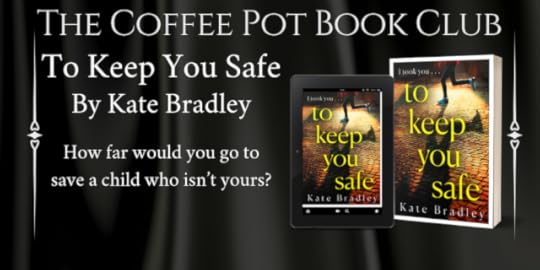
To Keep You Safe
By Kate Bradley
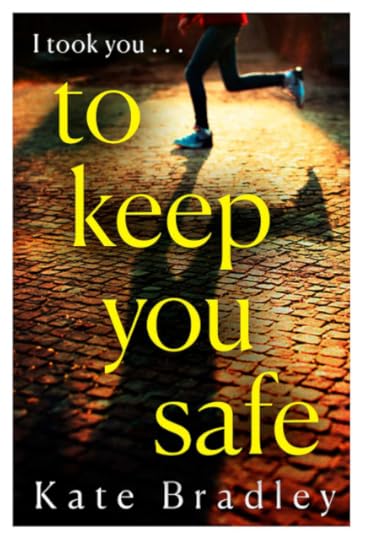
How far would you go to save a child who isn’t yours?
They’re coming for her. You don’t know who they are. You don’t know why they want her. But she’s in your care. And she’s vulnerable.
When a gang comes for Destiny, one of her pupils, teacher Jenni Wales does the only thing she can think of to keep her safe – she takes her.
But her decision could cost her everything…
Praise for To Keep You Safe
‘An addictive, original and brilliantly twisty thriller that asks how far we might go – and how much we’d be willing to sacrifice –to do the right thing’
T.M. Logan
‘I was gripped by this fast-paced thriller with a unique and fascinating character at the heart’
Claire McGowan
‘A clever, chilling and compelling debut’
Diane Jeffery
‘Kate Bradley has created a truly remarkable novel and I can’t wait to read her next one’
James Carol
‘Gripping, thought-provoking, tense and highly recommend’
Karen Hamilton
Excerpt
Prologue
I hang my legs over the cliff edge and look over so I can imagine your broken body lying on the beach below. I never tire of sitting here. I come even in winter, when the storms seethe, forcing me to grip the scant grass, because I feel that I could die here too. I like that. I watch the crashing waves below, beating against the bluff, pushing and pulling the flotsam and jetsam, relentless, relentless, relentless.
Then I do my own falling. I uncork a bottle and for a while feel the raw pain of my loss.
Walkers have approached me in the past; they see my solo picnic of wine and the inches between me and certain death, and they think I’m going to jump. The police have been here too. Twice they’ve arrested me under section 136 of the Mental Health Act, determined to get me assessed, but my psychiatrist intervened. He says that I push all of my grief and guilt onto the clifftop, as a coping mechanism. He’s wrong.
As I sober up at home, I spend the night staring at my bedroom ceiling while the world sleeps. I think about my choices, questions writhing like worms in my mind. I replay everything: everything I did and didn’t do. What it caused; about the people who got hurt. Who died. I remember blue eyes locked on mine, eyes filled with the pain and the nearness of death. Then the peace, after.
I know I am guilty.
And then when I tire of my self-hatred, I wonder what would’ve happened if we hadn’t come together like a planet spun from its orbit into the path of the other. How different my life would’ve been. And that’s what I can’t get over – that’s why I cannot know peace.
I turn over what happened to us in my mind, the memories getting no less worn through the constant re-examination. Relentless, relentless, relentless.
I don’t need this clifftop to remember you or what happened that Friday afternoon in May, three years ago, when everything that I’d ever loved, would be gone before the sun rose on Saturday.
I think and I think and I think; thoughts of what I’m going to do next beating relentlessly into the shallows of my mind.
Pick up your copy of
To Keep You Safe
Amazon UK • Amazon US • TheWorks
Kate Bradley
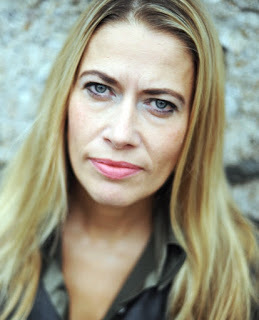
Kate Bradley worked for many years managing services for people who are marginalised by society; her work has taken her into prisons, mental health hospitals and alongside the homeless. She currently works in education. She holds a first-class honours degree in English Literature, in addition to qualifications in creative writing and teaching. Kate lives in a small coastal town just outside of Brighton with her husband and sons.
To Keep You Safe is her debut novel.
Connect with Kate: Website • Twitter
#BookReview — Of Darkness and Light: A Soli Hansen Mystery Book 1 by Heidi Eljarbo #HistoricalFiction WW2 @HeidiEljarbo

Of Darkness and Light
A Soli Hansen Mystery Book 1
By Heidi Eljarbo

Oslo, 1944.
Soli Hansen’s passion for art history is and always has been a way of life for her. While she spends her days working in an art shop, WWII is taking its toll on everyone. Apprehensive of the consequences, Soli avoids becoming entangled in the war resistance efforts. She closes her eyes in hopes the enemy will retreat and leave her beautiful country for good.
But when a woman is found dead in the alley alongside the art shop and a painting from the last auction goes missing, Soli is thrown into the thickest of the fray involving both Nazi art theft and the Norwegian resistance.
Once Soli finds her courage, there’s no turning back. Her personal life is turned upside-down with danger, lies, spying, and an incredible discovery.

“Chiaroscuro?” Arvid scratched his chin. “I am not familiar with that term.”
Soli smiled. “That means he painted strong contrast of light and dark.”
Rolf mumbled, “Kind of like this war. Light and dark—good and bad— interconnecting but widely divergent.”
If you turned your face away from suffering, then you could pretend it was not happening. To live in denial was easy, simple. Soli Hansen did not question where the paintings that her employer bought at auction came from, or what had become of their original owners. Sometimes, it was better not to know. Soli was sure that one day, someone, or something, would defeat the Nazis and free her people of their rule. It was not as if an art scholar could do anything about her country's occupation.
But when Mrs Gundersen dies under suspicious circumstances, and a painting goes missing from Mr Holm’s Fine Arts Shop, Soli is forced to open her eyes and confront the truth. The only way her beloved country would see the red flag with the black swastika lowered from the parliament building would be if people like her stopped being passive. After all, there was no guarantee that anyone would be coming to their aid. Soli must do her part and resist the invaders, and maybe by doing so, she could save one painting from falling into the hands of the enemy.
From the sinister sight of military planes heading towards Oslo to the discovery of a shocking truth, Of Darkness and Light: A Soli Hansen Mystery Book 1 by Heidi Eljarbo is the enthralling story of one young woman’s journey from art scholar to a Norwegian resistance spy.
There are some books that grab a reader from the opening sentence and take them upon a journey of historical discovery, Of Darkness and Light: A Soli Hansen Mystery Book 1 is such a book. Written with a sympathetic appreciation of the era that this novel is set in, and an empathic understanding of the human condition, Eljarbo has presented her readers with a book that is as riveting as it is page-turning. This is a novel that demands to be read in one sitting, for it is so tantalisingly brilliant that each page becomes a voyage of discovery. This is the kind of novel that one would happily forgo sleep to finish.
The story is told for the most part from Soli Hansen's, a young woman who has dedicated her life to art, perspective. Growing up, her brother was interested in politics, Soli, on the other hand, was looking for symbols and saints in the paintings from the Renaissance and Baroque era. They could not be more different. Soli is initially a very reluctant heroine and is, unlike her brother, incredibly naïve about what is happening around her — she is too absorbed in her work. Art is seemingly the only reason why she would break the occupier’s rules. One could perhaps surmise it is the one thing that she would willingly die trying to protect. Eva and Mary Andersen, the authors of the very secret and illegal house bulletin’s, seemingly have more knowledge about what is happening around them than their older cousin does, which is very telling. However, Soli reacts to the situation of living in an occupied country as I am sure many people would — she escapes into her own world, which so happens to be the art world. It is only when Mrs Gundersen dies so unexpectedly, and a painting goes missing from the shop that Soli allows herself to be drawn into the dangerous world of the resistance. But even then, there is a sense that she would not have joined this brave band of warriors if it were not for the plundering of the paintings of the Old Masters by the Nazis.
Soli is a very compassionate woman, but she is also very trusting, and at times I felt she was someone who could be very easily led. However, when she sets her mind to something, she is very loyal and determined to see it through to the bitter end. Eljarbo has presented her readers with a protagonist whose realism is tangible. Soli is a character whom a reader can get behind and root for. I thought her depiction was absolutely fabulous, and her story drove the narrative of this book forward. Eljarbo also reminders the reader, through her portrayal of Soli, how war can consume and change the lives of ordinary citizens sometimes for the better, more often for the worse.
Eljarbo has taken the risk of using duel timelines to tell this story. Although the majority of this book is set in 1940s Norway, Eljarbo also transports her readers back to 17th Century Malta. Eljarbo's portrayal of Caravaggio is utterly sublime. Caravaggio was an artist who captured the very essence of both the physical and the emotional in his paintings. Eljarbo has done precisely the same but with pen and ink.
There are several antagonists in this novel, but they are not always obvious, so therefore I am not going to say too much about them. What I will say is that they were masterfully drawn and wonderfully portrayed.
Many World War II novels are very graphic, very emotionally exhausting to read, but Of Darkness and Light is slightly different. There are moments of trepidation, fear, and violence, but they are not grotesquely graphic. Likewise, Eljarbo demonstrates how the Nazis deceived not only their own people but the world as to the fate of the Jews. Soli knows that some of the paintings come from Jewish households, but as to what has happened to the painting’s original owners, she remains blissfully oblivious. The Nazis in this book are feared, but Eljarbo also touches upon the subject of the women who fell in love with the young German soldiers. Through the desperate plight of Ingrid Moe, Eljarbo explores the stigmatization and the appalling treatment that these poor women faced because they dared to fall in love with the enemy. Ingrid is only in this story very briefly, but her plight was heartbreakingly tragic.
Of Darkness and Light: A Soli Hansen Mystery Book 1 by Heidi Eljarbo is a reward for any reader who adores quality World War II Historical Fiction. This is a book that is definitely deserving of your time. I cannot wait to get my hands on Book 2.
I Highly Recommend.
Review by Mary Anne Yarde.
The Coffee Pot Book Club.
Pick up your copy of
Of Darkness and Light
Heidi Eljarbo

Heidi Eljarbo is the bestselling author of Catching a Witch and its sequel Trailing the Hunter. She grew up in a home filled with books and artwork and she never truly imagined she would do anything other than write and paint. She studied art, languages, and history, all of which have come in handy when working as an author, magazine journalist, and painter.
After living in Canada, six US states, Japan, Switzerland, and Austria, Heidi now calls Norway home. She and her husband have a total of nine children, thirteen grandchildren--so far--in addition to a bouncy Wheaten Terrier and a bird.
Their favorite retreat is a mountain cabin, where they hike in the summertime and ski the vast, white terrain during winter.
Heidi's favorites are family, God's beautiful nature, and the word whimsical.
Connect with Heidi: Website • Facebook • Twitter • Pinterest • Instagram.
July 13, 2020
A Conversation with #HistoricalFiction author, M J Porter #CoffeePotBookClub #HistoricalFiction #Vikings #TheLastKing @coloursofunison
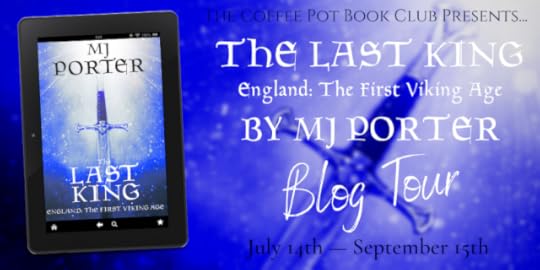
A Conversation with Historical Fiction author, M J Porter
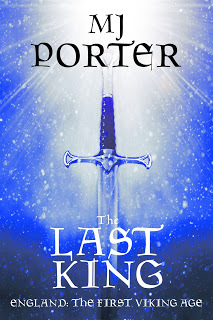 Mary Anne: A huge congratulations on your novel. The Last King is the first book in the The Ninth Century series, could you tell us a little about your series and what inspired you to write it?
Mary Anne: A huge congratulations on your novel. The Last King is the first book in the The Ninth Century series, could you tell us a little about your series and what inspired you to write it?
M.J Porter: Thank you for having me on your blog today.
I have wanted to write about Coelwulf, the main character, since discovering him while writing The Lady of Mercia’s Daughter (set about forty years later). I’ve been avoiding writing about King Alfred because of Bernard Cornwell’s The Last Kingdom books. But here was the opportunity to present a different interpretation of the same time period, using a recent archaeological find of 13 coins that presents Alfred and Coelwulf as equals. It was too good an opportunity to miss. (https://www.ashmolean.org/watlington-...)
The character of Coelwulf, his skills, and his personality, is a strange amalgamation of wanting to write an ‘edgier’ book (there’s a great deal of bad language in the book, blood and gore), while having a character who is just so good at what he does that people are in awe of him. In my mind Coelwulf is a mash-up of an 18 rated action film, with the sprinkling of an athlete at the peak of their career, and a very lethal one at that, with only one purpose in mind.
I intended to write just the one book, but I quickly changed my mind when I realised just how much I enjoyed writing the characters, and just how much I could gleam from the sources of the period.
Mary Anne: What drew you towards the Early Medieval era in which to set your book?
M.J Porter: I love the Early Medieval era. My first love was Elizabeth I, but at Uni I discovered the kingdoms of early England, the early Welsh kingdoms, and of course, the Vikings. I was fascinated by the development of the early kingdoms, of the people and of the interactions between them all. I’d only ever studied the Tudors and Louis XIV before (and the First World War). The earlier period had so much more scope for the imagination, and didn’t (in my mind, at least) get bogged down with tedious ‘ceremony’ and ‘court etiquette.’ I didn’t have to read lots of descriptions about the clothes that everyone wore.
I think it’s also a huge plus that the women of the Early English period are not the women of the medieval period – they are not ‘owned’ by their fathers or their husbands, they could witness legal documents, they could divorce their husbands and they could control more of their destiny. There aren’t too many women in The Last King, although I have written about them in other books set in Early England.
Mary Anne: What were the challenges you faced in researching this period of history and were there any unexpected surprises?
M.J Porter: Writing about this time period is fascinating. There is so much that is ‘known’ but also ‘not known’ and it’s only when you start to dig beneath the surface that you discover all the things you want to know that no one else ever seems to have considered writing down, or putting on the web. Focusing on historical figures for whom little is known, only adds to the frustration and desire to unravel events.
For The Last King, I spent a great deal of time looking at maps and learning about rivers and the ancient roads of Mercia. One of the most amusing aspects is trying to determine how long it would have taken people to get from one place to another! I rely on Google Maps and take a guess somewhere between how long it takes a person to walk or cycle there. I also ask my daughter many, many questions about horses as she works at the local stables. I’ve named Coelwulf’s horse after her favourite horse, although changed the name a little bit from Hayden to Haden, which surprised me by being Anglo-Saxon in origin.
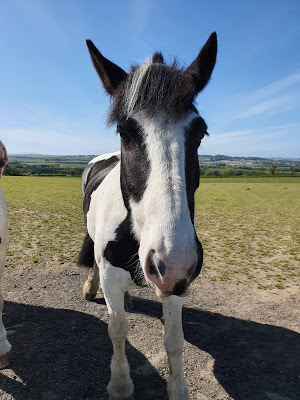
Mary Anne: What do you think is the most challenging aspect of writing Historical Fiction?
M.J Porter: For the Early English period, the most challenging aspect is understanding the sources. They are complicated and can never be taken at face value. Decisions have to be made about what to rely on, and what to ignore. Every writer, whether of fiction, or non-fiction, will have biases as to what they think constitutes ‘the historical record’ and what doesn’t. I personally prefer to use the Anglo-Saxon Chronicle as a starting point for my novels. Often the lack of information about my characters is enough to make me want to reconsider the narrative as it’s presented by the author(s), and the potential ‘other’ scenarios that they might be ignoring or covering-up.
Learning how to use the information the sources presents to make the time period feel ‘real’ is a challenge. There are no pictures of people, there’s rarely an idea of what people looked like, or what their personality was. It’s a bit like doing a jigsaw puzzle without the picture before you and having to work your way ‘in’ from the border. But, it does give a writer more freedom than those writing about later time periods.
Mary Anne: What advice do you have for aspiring Historical Fiction authors?
M.J Porter: Know the time period you’re writing about, and not just what happens during it, but also what happens both before, and after, and in neighbouring countries as well. And, be aware of what ‘might have happened’ if certain events – normally births, deaths or wars – hadn’t happened. Remember, your characters don’t have the benefit of hindsight that you have as a writer. Everything to them would have been immediate, imminent and happening to them. Don’t fall into the trap of presenting everything as a fait accompli.
And, be prepared to be frustrated. There is always some niggly little fact that is just not mentioned anywhere. The decision then has to be made as to whether to ‘make it up’ or write around it, and readers will somehow always know if you make it up.
And on a final note, be prepared to do something a little bit ‘different,’ be bold, be creative, do whatever has to be done to engage an audience with the time period.
Mary Anne: Thank you so much for dropping by and chatting with us today.
If you would like to find out more about M.J Porter and her fabulous series, The Ninth Century, then you know what to do SCROLL DOWN!
The Last King: England: The First Viking Age
(The Ninth Century Book 1)
By M J Porter

They sent three hundred warriors to kill one man. It wasn’t enough.
Mercia lies broken but not beaten, her alliance with Wessex in tatters.
Coelwulf, a fierce and bloody warrior, hears whispers that Mercia has been betrayed from his home in the west. He fears no man, especially not the Vikings sent to hunt him down.
To discover the truth of the rumours he hears, Coelwulf must travel to the heart of Mercia, and what he finds there will determine the fate of Mercia, as well as his own.
Pick up your copy of
The Last King: England: The First Viking Age
For only 0.99 on Kindle for a Limited Time
Add The Ninth Century series to your ‘to-read list today!
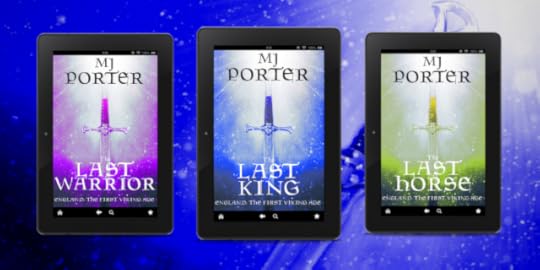
M J Porter
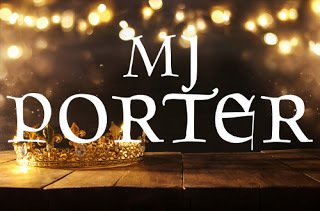
I'm an author of fantasy (viking age/dragon themed) and historical fiction (Early English, Vikings and the British Isles as a whole before the Norman Conquest), born in the old Mercian kingdom at some point since AD1066. I write A LOT. You've been warned!
Connect with M J Porter:
The Coffee Pot Book Club
...more
- Mary Anne Yarde's profile
- 159 followers



